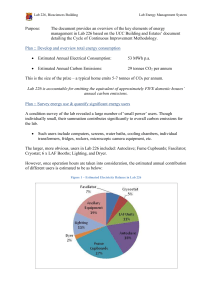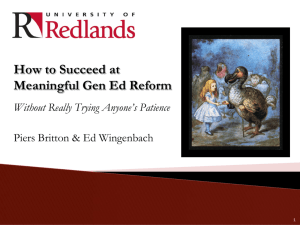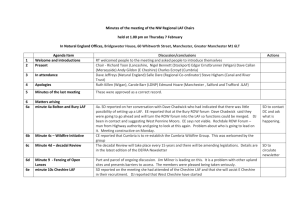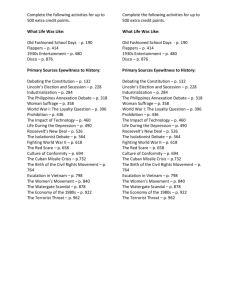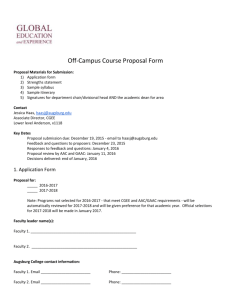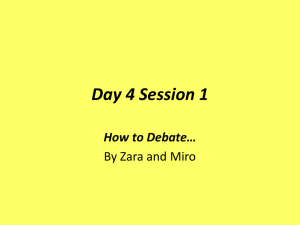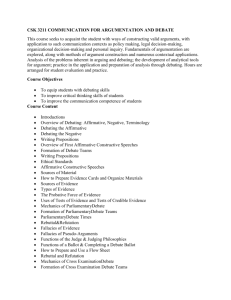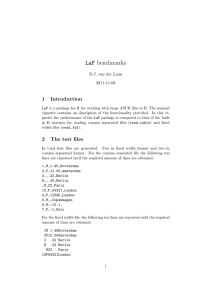NADA 2015 ELECTIVES SCHED updated 3
advertisement
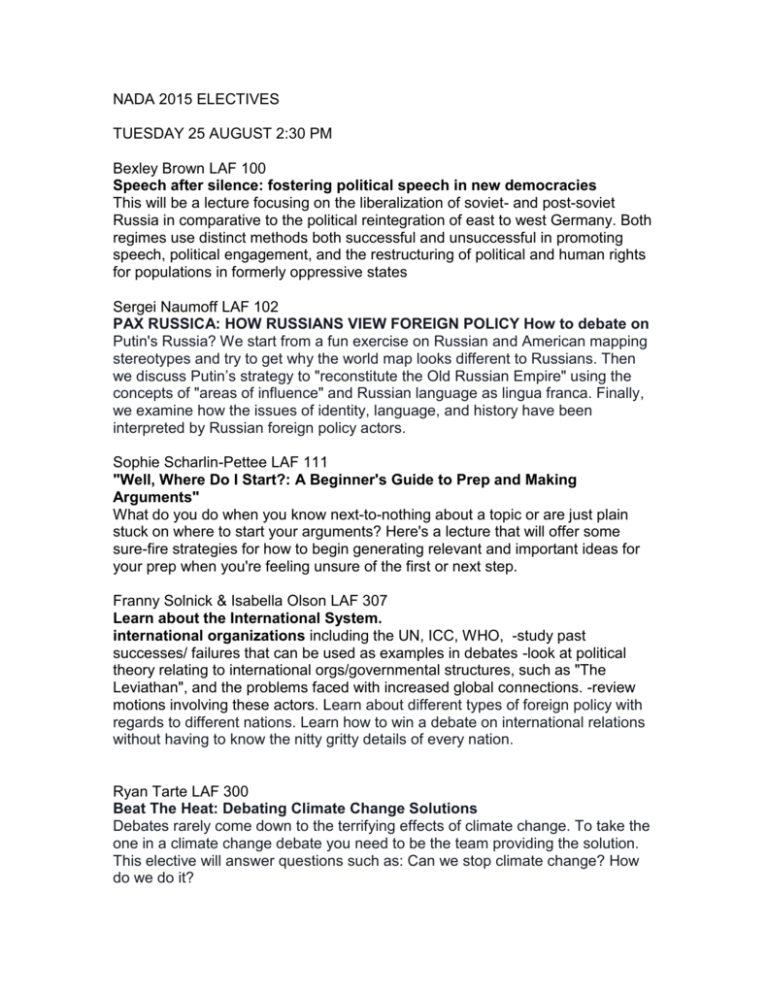
NADA 2015 ELECTIVES TUESDAY 25 AUGUST 2:30 PM Bexley Brown LAF 100 Speech after silence: fostering political speech in new democracies This will be a lecture focusing on the liberalization of soviet- and post-soviet Russia in comparative to the political reintegration of east to west Germany. Both regimes use distinct methods both successful and unsuccessful in promoting speech, political engagement, and the restructuring of political and human rights for populations in formerly oppressive states Sergei Naumoff LAF 102 PAX RUSSICA: HOW RUSSIANS VIEW FOREIGN POLICY How to debate on Putin's Russia? We start from a fun exercise on Russian and American mapping stereotypes and try to get why the world map looks different to Russians. Then we discuss Putin’s strategy to "reconstitute the Old Russian Empire" using the concepts of "areas of influence" and Russian language as lingua franca. Finally, we examine how the issues of identity, language, and history have been interpreted by Russian foreign policy actors. Sophie Scharlin-Pettee LAF 111 "Well, Where Do I Start?: A Beginner's Guide to Prep and Making Arguments" What do you do when you know next-to-nothing about a topic or are just plain stuck on where to start your arguments? Here's a lecture that will offer some sure-fire strategies for how to begin generating relevant and important ideas for your prep when you're feeling unsure of the first or next step. Franny Solnick & Isabella Olson LAF 307 Learn about the International System. international organizations including the UN, ICC, WHO, -study past successes/ failures that can be used as examples in debates -look at political theory relating to international orgs/governmental structures, such as "The Leviathan", and the problems faced with increased global connections. -review motions involving these actors. Learn about different types of foreign policy with regards to different nations. Learn how to win a debate on international relations without having to know the nitty gritty details of every nation. Ryan Tarte LAF 300 Beat The Heat: Debating Climate Change Solutions Debates rarely come down to the terrifying effects of climate change. To take the one in a climate change debate you need to be the team providing the solution. This elective will answer questions such as: Can we stop climate change? How do we do it? WEDNESDAY 26 AUGUST 2:30 PM Duncan Crowe LAF 307 Consequentialism in BP: How to Use it, How to Deconstruct it, How to Use Something Else Increasingly in British Parliamentary debating Consequentialism, an approach to moral philosophy that explains ‘goodness’ in terms of the consequences of taking an action has become a form of default. This elective will look at possible reasons this is the case, different ways to think about and motivate consequentialist moral frameworks and finally how to motivate alternative moral frameworks and why it might be tactically beneficial to do so. Paul Gross LAF 102 HOW I LEARNED TO STOP WORRYING AND LOVE 1ST PROP By the end of my debate career, there was no position I liked more than first prop. I'll explain how and why it's the best position, and how to set up a debate to ensure strong performance. Sergei Naumoff LAF 111 RUSSIA, UKRAINE AND EUROPE What are the key drivers behind the Russia’s government policy in Eastern Europe? We are going to address both the evolution of the EU’s strategy towards its neighbors to the East, and Russia’s perception of the EU in the context of crisis over Ukraine. EU and US sanctions against Russia over Ukraine crisis efficiency will be discussed in comparison to Iran/North Korea/Cuba. The Kosovo analogy to justify the annexation of Crimea in 2014 will be examined as well. Practice will include working on two-state solution approach for Ukraine using the Israel/Palestine model. Franny Solnick LAF 100 Translating Judging into Debating Strategy - go over basics of judging (not necessarily the practices covered in briefings, etc, but more on the thought process of judges) -apply a judging metric to debate strategy, such as how to persuade judges, how to make speeches easier to judge, how to view rounds you are debating in from the perspective of the judge -how to apply judge feedback to self-improvement Sophie Scharlin-Pettee LAF 300 "When the F-Word isn't Actually Bad At All: A Beginner's Guide to Debating Feminism" Ever struggle to define feminism? Feel like those "feminism debates" always turn into a tangled mess? Not really sure what it is or what those sneaky "goals" of the Feminist Movement are or should be? Here's a lecture that will demystify the F-Word and hopefully help you debate this tricky subject and maybe even get you interested in how it works in daily life. THURSDAY 27 AUGUST 2:30 PM Sophie Scharlin-Pettee LAF 100 "How to Get the 1 (Or How to Not Get the Four): A Beginner's Guide to Simple Strategy" Know nothing about a topic? Are you back-half and your front team has taken everything? Is the debate feeling uncomfortably close? Here's a lecture that will outline strategy for how to make you and your partner the most important team in the debate, or at worst, how to get anything but the four. Duncan Crowe LAF 102 Approaches to Opening Opposition This elective will look at various ways to approach Opening Opposition, traditionally regarded as one of the most difficult, if not the most difficult, positions in BP. We will look at alternative ways to approach constructing an opening opposition case strategically, in terms of both making maximum use of prep time and positioning yourself well with respect to other teams. We will also consider the question of whether Opening Opposition has become easier due to changes in judging paradigms over the years. Megan Towles LAF 111 DEBATING FOR JUDGES & JUDGING DEBATERS Because in he WUDC format you can be a debater and a judge while an undergraduate, there are opportunities for debaters to see things from the other side. Learn how the judging process works, how the decisions are made in consensus, what judges do and do not notice, and how you can take advantage of these situations as a debater. Isabella Olson LAF 300 Middle Eastern Relations Understand the background and histories behind current on going conflicts in the Middle East, what middle eastern nations are doing about it, and how the west interacts with these nations. Ryan Tartre LAF 307 Debating art and cultural artifacts Art has an incredible cultural significance in the modern world, but 19th and 20th century art thieves and archaeologists have led to the proliferation of artifacts in museums and private collections across the world. This elective answers the questions: What is the significance of these pieces? Who should have ownership over these pieces? FRIDAY 28 AUGUST 2:30 PM Camara Hudson LAF 111 Making Sense of Race in Debate - Rachel Dolezal, Black Lives Matter and White Feminism Debate About Race and ethnicity are Sometimes hard and can be quite tricky if you lack the right information. We will be talking about everything from the ways That is Looked at race around the world to the quick case for more news anchors of color, race and why even bleeds into debates over feminism and other topics. Duncan Crowe LAF 100 Democracy and Debating This elective will consider different aspects of democracy as they come up in debating. What is democracy for? What function does it serve within a wider account of the liberal state. How should voting be understood and what are various standard arguments that can be made of either side of frequent debates about democracy. Finally how might we understand democracy as practiced in Western Liberal democracies in contrast to the practice of democracy in the developing world, or in dictatorships or in corporate and commercial settings. Paul Gross LAF 102 THE FIVE THINGS YOU NEED TO KNOW TO DO WELL IN 90% OF ECONOMICS DEBATES Currency valuation/devaluation, basic theories of taxation and gov't spending, supply & demand, investor confidence & moral hazard, sovereign debt. I will discuss these thrilling topics with enthusiasm, vigor, and (hopefully) clarity. Megan Towles LAF 300 REFUTE THIS! Basic Refutation with Drills Learn how to refute economically and with a sense of what needs to be refuted. See examples and learn techniques. You requested this elective, and now here it is!

